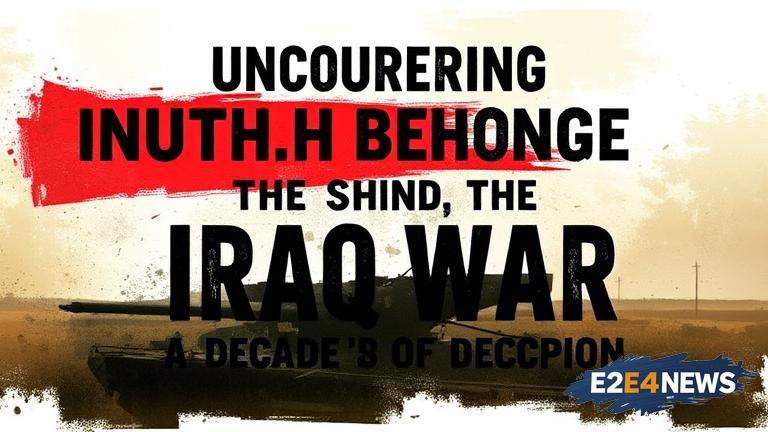The Iraq War, which began in 2003, was a pivotal moment in modern history, marked by controversy and deception. The war was sparked by the US and UK governments, led by President George W. Bush and Prime Minister Tony Blair, respectively. The invasion was justified by claims that Iraqi dictator Saddam Hussein possessed weapons of mass destruction, a claim that was later proven to be false. Christopher Meyer, the former UK ambassador to the US, has revealed that the British government was aware of the lack of evidence for WMDs, but chose to support the US-led invasion nonetheless. Meyer’s testimony has shed new light on the events leading up to the war, exposing a culture of secrecy and deception within the British government. The war resulted in the deaths of hundreds of thousands of civilians, as well as the displacement of millions of people. The aftermath of the war saw widespread chaos and instability, with the rise of extremist groups such as ISIS. The legacy of the Iraq War continues to be felt today, with many questioning the motivations and actions of the US and UK governments. The war has also had a profound impact on the Middle East, contributing to ongoing conflicts and instability in the region. In the years since the war, numerous investigations and inquiries have been conducted, but many questions remain unanswered. The Chilcot Inquiry, established by the British government, found that the war was based on flawed intelligence and that the UK government had failed to exhaust all peaceful options before resorting to military action. Despite these findings, many feel that those responsible for the war have not been held accountable. The Iraq War serves as a cautionary tale about the dangers of unchecked power and the importance of transparency and accountability in government. As the world continues to grapple with the consequences of the war, it is essential that we learn from the past and work towards a more peaceful and just future. The story of the Iraq War is complex and multifaceted, involving a wide range of players and interests. At its core, however, it is a story about the human cost of war and the importance of holding those in power accountable for their actions. The war has also had a profound impact on the global economy, with estimates suggesting that it has cost the US alone over $2 trillion. As we move forward, it is essential that we prioritize diplomacy and cooperation, rather than resorting to military force. By examining the lessons of the Iraq War, we can work towards a more peaceful and stable world, where the rights and dignity of all people are respected and protected.
